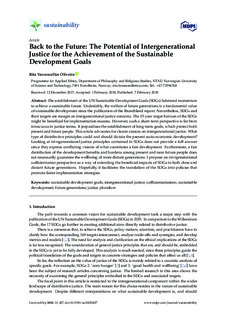| dc.contributor.author | Oliveira, Rita Vasconcellos | |
| dc.date.accessioned | 2018-02-20T08:32:25Z | |
| dc.date.available | 2018-02-20T08:32:25Z | |
| dc.date.created | 2018-01-23T14:23:59Z | |
| dc.date.issued | 2018 | |
| dc.identifier.citation | Sustainability. 2018, 10 (2), . | nb_NO |
| dc.identifier.issn | 2071-1050 | |
| dc.identifier.uri | http://hdl.handle.net/11250/2485812 | |
| dc.description.abstract | The establishment of the UN Sustainable Development Goals (SDGs) bolstered momentum to achieve a sustainable future. Undeniably, the welfare of future generations is a fundamental value of sustainable development since the publication of the Brundtland report. Nevertheless, SDGs and their targets are meagre on intergenerational justice concerns. The 15-year target horizon of the SDGs might be beneficial for implementation reasons. However, such a short-term perspective is far from innocuous in justice terms. It jeopardises the establishment of long-term goals, which protect both present and future people. This article advocates for clearer stances on intergenerational justice. What type of distributive principles could and should dictate the present socio-economic development? Looking at intragenerational justice principles contained in SDGs does not provide a full answer since they express conflicting visions of what constitutes a fair development. Furthermore, a fair distribution of the development benefits and burdens among present and near future people does not necessarily guarantee the wellbeing of more distant generations. I propose an intergenerational sufficientarian perspective as a way of extending the beneficial impacts of SDGs to both close and distant future generations. Hopefully, it facilitates the translation of the SDGs into policies that promote fairer implementation strategies. | nb_NO |
| dc.language.iso | eng | nb_NO |
| dc.publisher | MDPI | nb_NO |
| dc.rights | Navngivelse 4.0 Internasjonal | * |
| dc.rights.uri | http://creativecommons.org/licenses/by/4.0/deed.no | * |
| dc.title | Back to the Future: The potential of Intergenerational Justice for the achievement of the Sustainable Development Goals | nb_NO |
| dc.type | Journal article | nb_NO |
| dc.type | Peer reviewed | nb_NO |
| dc.description.version | publishedVersion | nb_NO |
| dc.source.pagenumber | 16 | nb_NO |
| dc.source.volume | 10 | nb_NO |
| dc.source.journal | Sustainability | nb_NO |
| dc.source.issue | 2 | nb_NO |
| dc.identifier.doi | 10.3390/su10020427 | |
| dc.identifier.cristin | 1550048 | |
| dc.description.localcode | © 2018 by the author. Licensee MDPI, Basel, Switzerland. This article is an open access article distributed under the terms and conditions of the Creative Commons Attribution (CC BY) license (http://creativecommons.org/licenses/by/4.0/). | nb_NO |
| cristin.unitcode | 194,62,70,0 | |
| cristin.unitname | Institutt for filosofi og religionsvitenskap | |
| cristin.ispublished | true | |
| cristin.fulltext | original | |
| cristin.qualitycode | 1 | |

